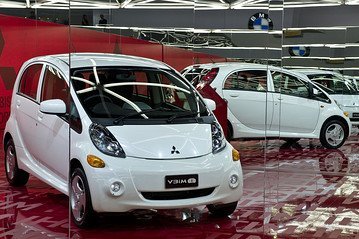Despite Problems, Auto Makers Stick With Lithium-Ion Batteries

Japanese and U.S. car makers insist the safety record of automotive lithium-ion batteries reflects years of cautious development, despite the recent incidents in Mitsubishi vehicles and Boeing Co.’s 787 Dreamliner fleet.
Mitsubishi Motors Co. said last month that a lithium-ion battery pack for its i-MiEV electric car caught fire while charging during a test inspection at the company’s plant on March 18. Three days later, the lithium-ion battery installed in a hybrid Outlander overheated and melted the cell and part of the battery pack when a new-car dealer tried to move the car.
According to the transport ministry, Japan has never before had a problem with lithium-ion batteries overheating in cars shipped inside the country.
Honda Motor Co., Nissan Motor Co., Toyota Motor Corp., General Motors Co., and Ford Motor Co. defended their use of the battery technology.
“Honda has conducted plenty of safety tests and created safe designs of its [lithium-ion battery technology]. There have been no outbreaks of fire or burning incidents from the battery at Honda,” a spokeswoman said. A Nissan spokesman added: “To date, more than 54,000 Nissan Leaf vehicles have been sold worldwide and all have performed without serious incident.”
GM and Ford, whose Chevrolet Volt, Ford Fusion, C-Max hybrids and Focus Electric use lithium ion technology, say their batteries are safe. Last year, the U.S. National Highway Traffic Safety Administration said there was no evidence the Volt was prone to catching fire after a probe of a fire in a vehicle whose battery leaked fluid and short-circuited after a crash test. “We haven’t seen any issues experienced by others,” said Ford spokesman Jason Lasecki.
The batteries that caused problems at Mitsubishi were manufactured by Lithium Energy Japan, a joint venture between Mitsubishi Motors, Mitsubishi Corp. and GS Yuasa Corp., the same company that makes the lithium-ion batteries at the center of Boeing’s Dreamliner woes.
GS Yuasa spokesman Hiroharu Nakano said the battery design is completely different from the one used on the Dreamliner and manufactured at a different site. He said the three companies in the venture have set up a joint team to investigate the cause of the problems.
Related News


